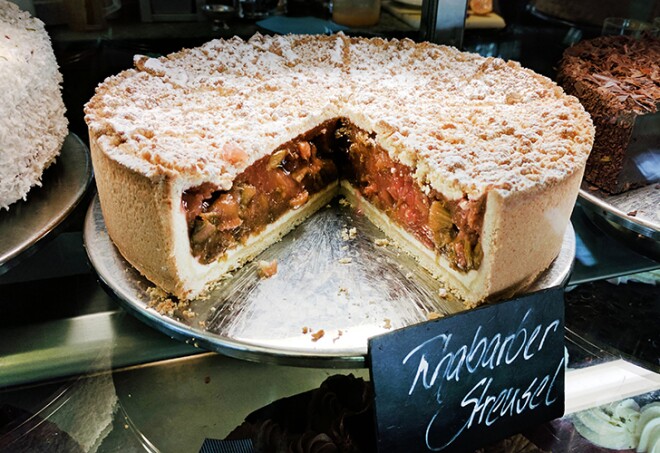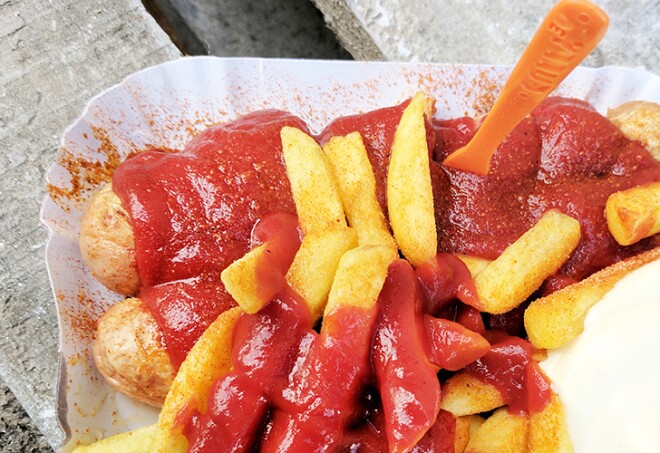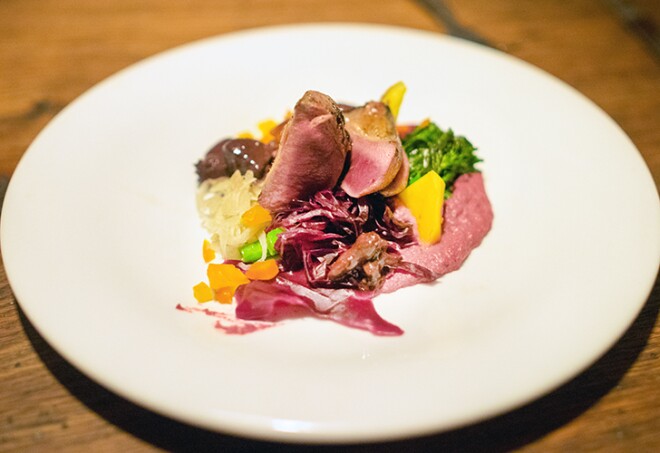The Perfect Weekend in Berlin
A weekend trip to visit Berlin offers just enough time to explore some of the city’s history and cultural hotspots, and, of course, tuck into some German cuisine and street food (hello currywurst). If it’s a meet the locals sort of weekend you’re after, pick a few neighborhoods to focus on: perhaps the restaurants, street art, and galleries of Mitte and Friedrichshain? Don’t miss the East Side Gallery. And, on Sunday, Prenzlauer Berg for its open air flea market. A perfect weekend indeed.
Bernauer Str. 63-64, 13355 Berlin, Germany
In true Berlin fashion, flea markets are not hard to find. One of the newer fleas takes place every Sunday at Mauerpark. I arrived on the early side, around 10am, and the space was already buzzing with locals on the hunt for vintage items, second-hand bikes, and inexpensive clothes. I wandered aimlessly through the park for about an hour, just taking in the sights and sounds of the city. At 3 p.m., a live karaoke party breaks out. It’s the perfect place to release your inner diva. Both the U-Bahn and the S-Bahn stop at Schönhauser Allee, as does the M1 tram.
Platz der Republik 1, 11011 Berlin, Germany
Built by Kaiser Wilhelm I in the late 19th century as a gesture to parliamentarians, Berlin’s famed Reichstag came into its own during the Weimar era—Germany’s first attempt at democracy. The parliament building burned under mysterious circumstances in 1933, leading to the suspension of civil rights and Hitler’s ensuing dictatorship. Seized and shot to pieces by Soviet troops in 1945, then abandoned during the city’s division, the traumatized building reentered public life when the German government returned to Berlin following reunification. Today the Reichstag stands proud, topped by a glass dome designed by British architect Sir Norman Foster as a symbol of political transparency. Going inside the dome is very popular; you can look down on plenary sessions as well as admire sweeping city views.
Brunnenstraße 197-198, 10119 Berlin, Germany
If you’re looking for the epitome of “Hipster Berlin,” you can’t find anyplace more suitable than Mein Haus am See. In the most hip area of Mitte, Rosenthaler Platz, the cafe is more than just a coffee spot. It’s also a bar and club. During the day, you’ll see locals working on their laptops or drawing in sketchbooks, but when dusk starts to settle, the lights will dim and usually a DJ will be setting up the sound system. Get a seat in the back of the stadium benches and watch time just pass by. As an added bonus: Mein Haus am See offers free Wi-Fi and is open 24 hours!
Bergstraße 68, 10115 Berlin, Germany
Part third-wave coffee shop, part gallery, Distrikt is a great spot to enjoy high quality coffee as well as discover local up-and-coming artists. The exposed brick walls are perfect backgrounds for the rotating displays of artwork, as well as the café’s regular events, which include stand-up comedy evenings and even small operas. As well as locally-roasted coffee blends, you can also find whole-leaf teas and a brunch menu with antipodean influences.
Rosenthaler Str. 40 -41, 10178 Berlin, Germany
This is one of the most hectic and lively courtyards in Berlin. Located in Mitte, it is named after the Hackeschen Market, which is across the street. As in many of Berlin’s courtyards, the building complex around it consists of offices, businesses, factories, and apartment buildings. In this specific one sits a well-known movie theater, which makes it even busier. As this was the first courtyard and quite successful, today there are eight other courtyards between Rosenthal and the Sophienstraße. All around the courtyards, you’ll find numerous bars, restaurants, and clubs. The area has become one of the coolest places to go at night.
Pariser Platz, 10117 Berlin, Germany
Napoléon and his armies marched through it; revolutionaries and Nazis gathered beneath it; the Berlin Wall ran right behind: It’s safe to say that Berlin’s iconic Brandenburg Gate, completed in 1791, has pretty much seen it all. Designed by Carl Gotthard Langhans, who drew inspiration from the entrance to the Acropolis in Athens, the gate is best approached via Unter den Linden, the tree-lined boulevard that runs between the gate and the former Royal Palace. You can combine a visit here with nearby sights such as the Reichstag, Tiergarten Park, and the Memorial to the Murdered Jews of Europe. Since 2016, an impressive high-tech museum at the gate has offered a history of the city through the perspective of the iconic structure.
Lindenstraße 9-14, 10969 Berlin, Germany
The architecturally striking Jewish Museum is the best place in Berlin to get an overview of German-Jewish relations and to understand the nature of the integration of the two cultures before the Holocaust’s horrors. Designed by Daniel Libeskind, the building is clad in polished silver metal and features severe angles and thin window slits that create a deliberately jarring impression. The interior is equally intriguing, especially the three long, intersecting corridors that lead to installations addressing aspects of the Holocaust: a garden of pillars meant to disorient; a windowless Holocaust Tower; and a space filled with thousands of grimacing iron masks that grind together as you walk on them. Across the street, the Jewish Academy (open to the public) has a related research center, library, and educational institution.
Museum Island, Berlin, Germany
Visiting at least one of the five museums that make up Museum Island, a UNESCO World Heritage site, is a must for any serious culture-seeker in Berlin. A pioneering concept, this ensemble of public institutions brimming with exquisite artworks and historical artifacts traces its origin back to 1810 and King Friedrich Wilhelm III’s decision to open a museum for his personal collection of royal treasures. Today, the original Altes Museum—located opposite the former Royal Palace—is joined by the Pergamon Museum, with its jaw-dropping Middle Eastern antiquities; the Neues Museum and its treasures from ancient Egypt; the Alte Nationalgalerie’s collection of 19th-century European masters; and the Bode Museum, which hosts one of Europe’s most important sculpture collections.
83 Kollwitzstraße
Although this popular Prenzlauer Berg café only opened in 2005, it feels as if it has been part of the neighborhood forever. Lines from the 1919 poem by Kurt Schwitters that provided the café’s name adorn the walls alongside a reproduction of an Alphonse Mucha mural, and the interior has a classic art deco look (red leather banquettes, marble-topped tables, and red curtains) that perfectly matches the traditional German menu of breakfasts and lunches. It’s most famous for the former, including muesli and egg and crepe dishes, as well as elegant, bountiful tiered platters that brim with meats, cheeses, and fruits. Come early on weekends to beat the local families to a table, especially on the outdoor patio, which is perfectly positioned for people-watching.
Mehringdamm 36, 10961 Berlin, Germany
Everyone in Berlin has a favorite place to eat currywurst—tasty chopped pork sausage doused in a sauce made of curry powder and ketchup—but Curry 36 in Kreuzberg (along with Konnopke’s in Prenzlauer Berg) is one of the most consistently popular spots to procure this famous street-food snack. In fact, the place is so trendy that it sells Curry 36 merchandise in the shape of hoodies and even its own branded ketchup. Besides currywurst, the stall serves other sausage-y delights such as bockwurst and krakauers, as well as related meat products like burgers and meatballs. To be extra authentic, order your currywurst ohne darm (without skin) and enjoy it while standing at one of the outdoor tables.
Linienstraße 160, 10115 Berlin, Germany
It might be small and simple—conspicuously bare white walls, just a smattering of handmade wooden tables topped with flower arrangements, and a few barstools—but the updated German cuisine at Lokal is far from basic. With a commitment to local and organic ingredients, the kitchen draws on classic carnivore favorites like offal and game, making them look and taste completely unique. There are usually a couple of equally tasty dishes for vegetarians, also created using ingredients sourced from farms around Berlin. The atmosphere is generally quiet and pleasantly refined.
Torstraße 1, 10119 Berlin, Germany
Looming over one of central Berlin’s most vibrant intersections, this restored Bauhaus building with its distinctive 1920s curved facade was transformed in 2010 into the Berlin outpost of the glamorous Soho House hotel and private members brand. The building has heaps of history, having started as a Jewish-owned department store before being taken over by the Nazis and then occupied by the Communist regime for archival purposes.
Today, it’s one of Mitte’s foremost havens of hip, offering quirkily decorated rooms that mix vintage with contemporary design tropes—think Marshall speakers and old-school record players, floral armchairs, and art deco bathtubs. The lofts are even more astonishing, both for their capacious size and their industrial-chic aesthetic—some come with grand pianos and foosball tables. The hotel also has a rooftop pool and adjacent bar with views of Alexanderplatz, a concept retail area, a private cinema and library room with a bar that hosts occasional events open to the public, an in-house restaurant, and a Cowshed spa that’s a popular destination in its own right.
Today, it’s one of Mitte’s foremost havens of hip, offering quirkily decorated rooms that mix vintage with contemporary design tropes—think Marshall speakers and old-school record players, floral armchairs, and art deco bathtubs. The lofts are even more astonishing, both for their capacious size and their industrial-chic aesthetic—some come with grand pianos and foosball tables. The hotel also has a rooftop pool and adjacent bar with views of Alexanderplatz, a concept retail area, a private cinema and library room with a bar that hosts occasional events open to the public, an in-house restaurant, and a Cowshed spa that’s a popular destination in its own right.
70 Alt-Stralau
Berlin’s most surreal bar experience is right where you’d expect it to be—in the trendy Friedrichshain neighborhood. Just a few blocks from some of Berlin’s most legendary nightclubs, the club Wilde Renate is a mismatched collection of buildings surrounding a small beer garden. It’s an easy place to get lost, even more so because there’s a purposely-built labyrinth underneath the nightclub. The labyrinth, Peristal Signum, isn’t just an art installation but a full-on experience for the mind. It was designed haphazardly by three artists over nine months in 2010. The maze was built completely out of found scrap materials (like most everything else in Berlin) and includes everything from glass bottles to car parts. For 10€, you’re given a token to enter the labyrinth. Entries are scattered so that only one person enters at a time, though you’re likely to run into people once inside. Without spoiling too much, I’ll say it’s a trippy experience. Persistal Signum is open Wednesday to Saturday, from 6pm to 10pm, at Salon zur wilden Renate. Ask the bartender to put your name on the list to get inside the labyrinth. There’s usually a wait.
Mühlenstraße 3-100, 10243 Berlin, Germany
The most famous remaining stretch of the Berlin Wall gets its name from its location on the east side of the Spree River, as well as from its collection of political and satirical murals. Originally painted just after the wall fell, the murals were repainted (or in some cases painted over) in 2009 as a way of cleaning up the increasingly decayed originals and in recognition of the 20th anniversary of the fall of the wall. Today, a fence partly protects the gallery to prevent vandalism of the murals, but people throng here nonetheless, especially in summer. A museum at the site tells the fascinating story of the structure through interactive displays, original newsreel footage, and filmed interviews with Berliners who lived on both sides.
Zossener Str. 33, 10961 Berlin, Germany
The Spacehall Record Store is THE place to go to buy new or used records in Berlin. With plenty of listening stations, you can be sure you’re buying quality music. The space-like interior features some comfy (if not odd-shaped) couches and simple but quirky touches of design. Check out the room in the back to find good deals on used records. Or if you want some novelty band/DJ T-shirts, try the section up front.
























